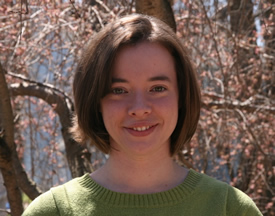
 |
| Alexis Garland |
By Rebecca Wyatt Thomas, OU Web Writer
Last year, Alexis Garland, a linguistics master’s graduate, received a Fulbright scholarship to study and conduct research in Germany for one year. Garland is nearing the end of her scholarship and gearing up for the next phase of her life.
While her initial plan was to study at the university in Freiburg, she ended up finding a better fit with researchers in Leipzig.
“It gave me the opportunity to work at the Max Planck institutes in Leipzig, which are some of the top research institutes in the world — a great experience,” Garland said.
Garland is working on projects for both the Max Planck Institute for Evolutionary Anthropology (EVA) and the Max Planck Institute for Cognitive and Brain Science (CBS). Garland is interested in the study of cognitive linguistics.
“At the EVA, I have been working with the developmental and comparative psychology department on a project that focuses on one-year-olds, examining their comprehension of absent referent pointing. It is along the lines of research on pre-linguistic gesture, social cognition and communication,” Garland said. “At the CBS, I have been working with the section of the Neuropsychology department that focuses on languages and communication, working on an experiment regarding how the brain reacts to meter, or patters of stress in syllable, in sentences.”
In addition to the research, Garland is taking courses at Universität Leipzig.
Garland’s background is in linguistics and her research background was limited. Garland gained most of her research in areas other than cognitive linguistics.
“I found that I had enough theoretical knowledge in most areas to be on par with other young researchers in both institutes and that working with teams on these experiments, people tend to fill in each others’ gaps, or compare thoughts about approaches, so you get a lot of input and information as you go along,” Garland said.
Prior to her participation in the research, Garland was concerned about her German language skills at a highly technical level like research.
“Language tends to be a mix at both institutes; there are a lot of international researchers from various countries, including the United States, and because everything is published in English, it is rarely purely conducted in one or the other languages,” Garland said.
When her scholarship ends in July, Garland isn’t sure where she will go next. She has applied to several doctoral research programs around the world, but she won’t hear about them until later in the spring. However, she does plan to continue researching in the area of cognitive linguistics.
“My interest tends towards communication, learning and memory—not surprising considering my background in linguistics, and work experience in education and sociology,” Garland said. “I am particularly drawn to comparative cognition, looking at broad comparisons of complex social animals, specifically in terms of communication and memory.”
The research Garland is doing on the one-year-olds involves setting up specific behavior experiments, whereas the meter in sentences research is a neurological one, where they will be measuring EEG waves in adults in response to sentences they’ve constructed. She said she likes being able to use multiple perspectives and methodologies in her research.
The research she is conducting can be used in areas from voice analysis software and artificial intelligence to reshaping how people understand evolution or the interaction of brain and behavior.
While most of her time is spent researching and in class, Garland has been able to travel with family and to visit friends. Garland, her mom and brother recently visited Berlin and Dresden in Germany and then Prague, Vienna and Italy, where she stopped in at the neuropsychology department at the University of Parma to learn more about their department. She plans to visit a friend in Edinburgh over Easter. He is an incoming Fulbright Scholarship recipient from Ireland who stayed with Garland’s family while he completed his Fulbright year at OU. Garland also hopes to visit friends in Switzerland, Denmark and Portugal before returning to the United States.
Garland said her stay in Germany has also been a cultural experience. She had already visited Germany as an undergraduate, and also knows many Germans who have stayed with her family through the years.
“I think it makes you more aware of the things you like and dislike about your own culture. After a while, you sort of pick the parts you like best out of each and try to bring them with you wherever you live,” Garland said.
Garland encourages all students to look into scholarship and other study abroad and research opportunities.
Through her stay in Germany and her travels thereafter, Garland plans to continue to update her blog for others to read about her adventures.
 Last year, Alexis Garland, a linguistics master’s graduate, received a Fulbright scholarship to study and conduct research in Germany for one year. Garland is nearing the end of her scholarship and gearing up for the next phase of her life. While her initial plan was to study at the university in Freiburg, she ended up finding a better fit with researchers in Leipzig. Garland is working on projects for both the Max Planck Institute for Evolutionary Anthropology (EVA) and the Max Planck Institute for Cognitive and Brain Science (CBS). Garland is interested in the study of cognitive linguistics.
Last year, Alexis Garland, a linguistics master’s graduate, received a Fulbright scholarship to study and conduct research in Germany for one year. Garland is nearing the end of her scholarship and gearing up for the next phase of her life. While her initial plan was to study at the university in Freiburg, she ended up finding a better fit with researchers in Leipzig. Garland is working on projects for both the Max Planck Institute for Evolutionary Anthropology (EVA) and the Max Planck Institute for Cognitive and Brain Science (CBS). Garland is interested in the study of cognitive linguistics.